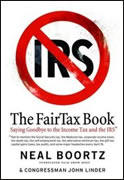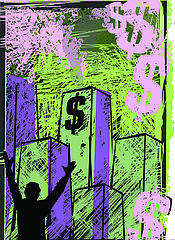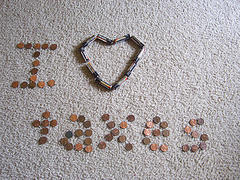Politics: Flattening America
On a recent trip to Borders I ran across a book that argues for the abolishment of the IRS and the inevitable implementation of a national sales tax. I’ve always found humor in moral conservatives who want all the money they can get (opposite of Jesus’s teachings). But today I was struck more forcefully. Instead of being hidden on the back shelves of the current issues section (where I could laugh at it in private), this particular one was on display near the front aisle. Must be a best seller? Depressing.

I find it necessary to lend insights upon this much heated debate. My conclusion: a flat tax is, in the language of the Christian Right, immoral.
Supporters of a flat tax argue that if they want to give their money away to charity they should be allowed to on their own terms, and not have to support governmentally funded programs like Welfare and Medicaid (or even worse: stem cell research. Oh No!). Why should a wealthier individual be forced to pay a higher percentage of their taxes than a less fortunate person does? Well, the problem lies in the fact that many wealthy Americans don’t believe that the lower class is less fortunate at all, rather, they are too lazy to work or get a good education and thus, want governmental hand outs (because of course if such accuser was educated by an inner city school in the slums they wouldn’t need any help). And conversely, the CEO’s of the world are just hard working Americans earning an honest buck who are at the mercy of the government (Ivy League dad had nothing to do with it). Now maybe I’m being a little exaggeratory, but the point stands.
At the current rate, the highest tax bracket pays 38.6% of their income to taxes. This means that someone who makes one million dollars right now would have to pay $386,000 a year to taxes. If a flat tax was implemented, specifically one similar to H.R. 25, there would be a 30% tax on all goods and service. Now put this into perspective, that same millionaire would now only pay 30% of what he spent. Let’s act like the millionaire splurges a little. He goes on vacation, buys a new house, buys a new car, and makes a college payment for his son or daughter. Roughly, he spends $400,000 this year. This means that now, this same millionaire has to pay $120,000 in taxes. As one can see, if a flat tax was put into place, this millionaire would only be paying 12% of his/ her income to taxes.

Conversely, someone who makes $25,000 a year would right now have to pay 15% of his income or in dollars, $3,750. Now, assume that this person supports a family, living pay check to pay check and spends all of his earned money on basic survival. With a flat tax he would now be paying $7,500 dollars a year in taxes.
One can see what would happen if the tax system was changed to a flat tax. The rich would significantly pay a smaller percentage of their income than the least fortunate of our country. A flat tax (sales tax) seems fair on the surface because everyone pays the same percent of what they buy, but many conservatives don’t understand that the lowest bracket has to use their entire income to make purchases for everyday survival while the rich need pay a much smaller percentage of their income for the same. This is not fair at all. If someone thinks that a millionaire should only pay 12% of his income while a person making $25,000 a year should be paying 30% they have their priorities, their morals, and certainly their ethical standards all out-of-whack. There is no reasonably logical or ethical justification for putting more of the tax burden on the lower class.
Now the dissenting opinions will predictably disagree, uttering that they have the common good in mind, referencing supply side economics (trickle down).

The main problem with the trickle down theory is that it depends on the generosity of the elite, and with many of them supporting a flat tax, which would only line their pockets more; one can see that the wealthiest American’s charity will only go so far. If a business owner gets a refund check in the mail, due to President W. Bush’s tax cuts will he necessarily invest that money into his company? What is stopping that business owner from taking the check and investing it in his own personal savings account, or going on a vacation for that matter? Nothing, so much of the time, especially in an economic recession, understandably, that is exactly what happens.
And yes I know what you are thinking. “But won’t a business owner make more money in the long run if he reinvests in his company? Therefore, the trickle down theory doesn’t depend upon charity, but good business.” And predictably, you will then argue, “see I have the best interests of the people in mind too, but instead of giving the poor a crutch like the liberals want to do, a sales tax will give them a job to support themselves.” Bravo Mr. conservative, Bravo. I am glad you don’t only have the fullness of your pockets as motivation and to some extent, I understand your argument.
But it still stands that the government would collect significantly less money with a sales tax than otherwise. And the reality is that thousands of programs and schools are under funded, not to mention the millions without health care. If we want to actually improve the state of affairs for our citizens it is going to take more money than that which would be brought in by a flat tax. Yes, the trickle down theory’s ideal good business motivated job creation sounds pretty but more $7.00/hr jobs to decrease unemployment statistics won’t: produce quality health care for those who need it, make public school educations equal, give inner city children tempting alternatives than the streets, etc.

Many flat tax supporters are great people who have great morals and an incisive need to help others but they have simply fallen into the flat tax trap. People hear the words “equal percent” and automatically assume such a system is fairer. Yes, it is nice to get a refund check at the end of the year but with the decrepit nature of inner-city public schools and the millions without health care, maybe we should reevaluate our priorities. It is a choice, your $500 check, or millions of Americans. To me, it’s an easy choice.
Note: There are no versus in the bible mentioning gay marriage, but hundreds mention poverty.


1 Comments:
You have to admit though, the flat tax is an interesting concept. I've seen plans that still work within tax brackets and exempt lower classes from the tax on things like food and clothing, those very necessities you're mentioning. I also think your numbers are off. The wealthy buy expensive cars, big homes, yachts, expensive foods and fine wines-- all of which would be taxed. The tax rate increases as spending increases, so a lower-income family could purchase necessities, keep all of their income tax, and pay effectively pay a very little percetange.
Post a Comment
<< Home